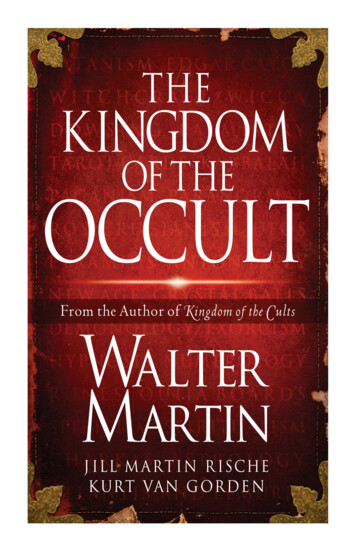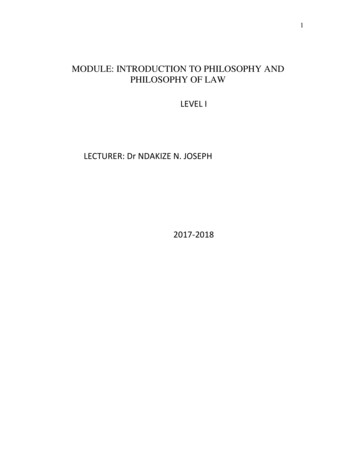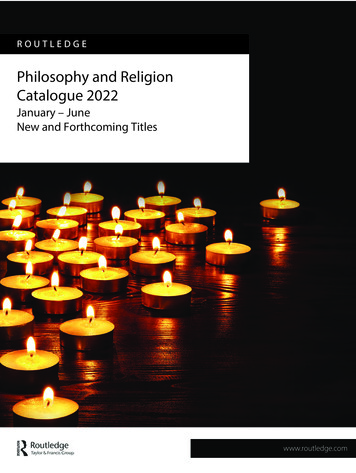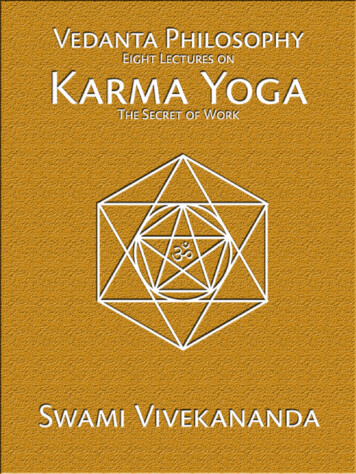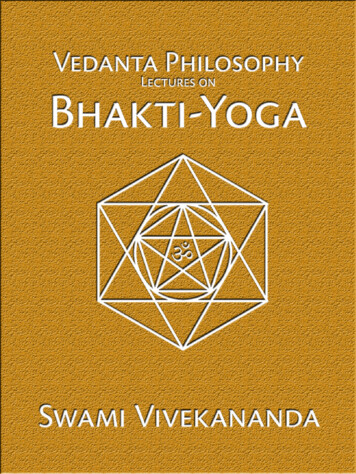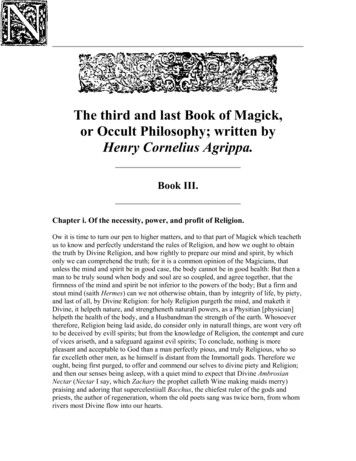
Transcription
The third and last Book of Magick,or Occult Philosophy; written byHenry Cornelius Agrippa.Book III.Chapter i. Of the necessity, power, and profit of Religion.Ow it is time to turn our pen to higher matters, and to that part of Magick which teachethus to know and perfectly understand the rules of Religion, and how we ought to obtainthe truth by Divine Religion, and how rightly to prepare our mind and spirit, by whichonly we can comprehend the truth; for it is a common opinion of the Magicians, thatunless the mind and spirit be in good case, the body cannot be in good health: But then aman to be truly sound when body and soul are so coupled, and agree together, that thefirmness of the mind and spirit be not inferior to the powers of the body; But a firm andstout mind (saith Hermes) can we not otherwise obtain, than by integrity of life, by piety,and last of all, by Divine Religion: for holy Religion purgeth the mind, and maketh itDivine, it helpeth nature, and strengtheneth naturall powers, as a Physitian [physician]helpeth the health of the body, and a Husbandman the strength of the earth. Whosoevertherefore, Religion being laid aside, do consider only in naturall things, are wont very oftto be deceived by evill spirits; but from the knowledge of Religion, the contempt and cureof vices ariseth, and a safeguard against evil spirits; To conclude, nothing is morepleasant and acceptable to God than a man perfectly pious, and truly Religious, who sofar excelleth other men, as he himself is distant from the Immortall gods. Therefore weought, being first purged, to offer and commend our selves to divine piety and Religion;and then our senses being asleep, with a quiet mind to expect that Divine AmbrosianNectar (Nectar I say, which Zachary the prophet calleth Wine making maids merry)praising and adoring that supercelestiiall Bacchus, the chiefest ruler of the gods andpriests, the author of regeneration, whom the old poets sang was twice born, from whomrivers most Divine flow into our hearts.
Chapter ii. Of concealing of those things which are secret in Religion.Whosoever therefore thou art that now desireth to study thisd science, keep silence andconstantly conceal within the secret closets of your Religious breast, so holy adetermination; for (as Mercury saith) to publish to the knowledge of many a speechthroughly filled with so great majesty of the Deity, is a sign of an irreligious spirit; andDivine Plato commanded, that holy and secret mysteries should not be divulged to thepeople; Pythagoras also and Porphyrius consecrated their followers to a Religioussilence; Orpheus also, which a certain terrible authority of Religion did exact an oath ofsilence, and from those he did initiate to the Ceremonies of holy things: Whence in theverses concerning the holy word he sings,You, that Admirers are of vertue, stay,Consider well what I to you shall say.But you, that sacred laws contemn, prophane?Away from hence, return no more again.But thou O Museus whose mind is high,Observe my words, and read them with thine eye,And them within thy sacred breast repone,And in thy journey, think of God aloneThe Author of all things, that cannot dye,Of whom we shall not treate --So in Virgil we read of the SybillThe goddess comes, hence, hence, all ye prophane,The Prophet cries, and from her grove refrain.Hence also in celebrating the holy mysteries of Ceres Eleusine, they only were admittedto be initiated, the cryer proclaiming the prophane vulgar to depart; and in Esdras weread this precept concerning the Cabalisticall secret of the Hebrews, declared in theseverses, Thou shalt deliver those books to the wise men of the people, whose hearts thouknowest can comprehend them, and keep those secrets. Therefore the Religious volumesof the Egyptians & those belonging to the secrets of their ceremonies, were made ofconsecrated paper; in these they did write down leters [letters] which might not easily beknown, which they call holy. Macrobius Marcellinus and others say, they were calledHieroglyphics, least perchance the writings of this kind should be known to the prophane,which also Apuleius testifies in these words, saying, The sacrifice being ended, from asecret retyred closet he bringeth forth certain books noted with obscure letters, affordingcompendious words of the conceived speech, partly by the figures of beasts of this kind,partly by figures full of knots, and crooked in the manner of a wheel & set thick, twiningabout like vine tendrels, the reading thereby being defended from the curiosity of theprophane; Therefore we shall be worthy scholars of this science, if we be silent and hidethose things which are secret in religion, for the promise of silence (as saith Tertullian) isdue to Religion; but they which do otherwise are in very great danger, whence Apuleiussaith concerning secrets of holy Writs; I would tell it you, if it were lawfull to tell it; you
should know it; if it were lawfull to hear it; but both ears and tongue would contract thesame guilt of rash curiosity. So we read Theodorus the tragick poet, when he would havereferred somethings of the mysteries of the Jews Scripture to a certain fable, wasdeprived of sight. Theopompus also who began to translate somethings out of the Divinelaw into the Greek tongue, was presently troubled in mind and spirit, whence afterwardearnestly desiring God, wherefore this had happened to him, received an answer in adream, because he had basely polluted Divine things, by setting them forth in publike[public]. One Numenius also being very curious of hidden things, incurred the displeasureof the Divine powers, because he interpreted the holy mysteries of the goddesse Eleusinaand published them for he dreamed that the goddesses of Eleusis stood in a whores habitbefore the Brothell house, which when he wondred at, they wrathfully answered, thatthey were by him violently drawn from their modestly and prostituted everywhere to allcommers, by which he was admonished, that the Ceremonies of the gods ought not to bedivulged. Therefore it hath alwaies been the great care of the Ancients to wrap up themysteries of God and nature, and hide them with diverse Aenigmaes [enigmas], whichlaw the Indians, Brachmans [Brahmans], Æthiopians, Persians, and Egyptians alsoobserved; hence Mercurius, Orpheus, and all the ancient Poets and Philosophers,Pythagoras, Socrates, Plato Aristoxenus, Ammonius, kept them inviolably. HencePlotinus and Origenes and the other disciples of Ammonius (as Porphyry relates in hisbook of the education and Discipline of Plotinus) sware, never to set forth the Decrees oftheir master. And because Plotinus, brake his oath made to Ammonius, and published hismysteries, for the punishment of his transgression, he was consumed (as they say) by theHorrible disease of Lice. Crist also himself, while he lived on earth, spoke after thatmanner and fashion that only the more intimate disciples should understand the mysteryof the word of God, but the other should perceive the parables only: commandingmoreover that holy things should not be given to Dogs, nor pearles cast to Swine:Therefore the Prophet saith, I have hid thy words in my heart, that I might not sin againstthee. Therefore it is not fit that those secrets which are amongst a few wise men, andcommunicated by mouth only, should be publikly written. Wherefor you will pardon me,If I pass over in silence many and the chiefest secret mysteries of Ceremonial Magick. Isuppose I shal do enough, if I open those things which are necessary to be known, andyou by the reading of this book go not away altogether empty of these mysteries; but onthat condition let these things be communicated to you, on which Dionysius boundTimothy, that they which perceive these Secrets, would not expose them to the unworthy,but gather them together amongst wise men, and keep them with that reverence that isdue to them. Furthermore I would also warne you in the beginning, that even as thedivine powers detest publike things and profane, and love secrecy: So every Magicalexperiment fleeth the publike, seeks to be hid, is strengthened by silence, but is destroyedby publicationm neither doth any compleate effect follow after; all these things sufferlosse, when they are poured into prating and incredulous minds; therefore it behoveth aMagicall operator, if he would get fruit from this art, to be secret, and to manifest tonone, neither his work nor place, not time, neither his desire nor will, unless either to amaster, or partner, or companion, who also ought to be faithfull, believing, silent, anddignified by nature and education: Seeing that even the prating of a companion, hisincredulity and unworthiness hindreth and disturbeth the effect in every operation.
Chapter iii. What dignification is required, that one may be a trueMagician and a worker of miracles.About the beginning of the first book of this work, we have spoken what manner ofperson a Magician ought to be; but now we will declare a msyticall and secret matter,necessary for every one who desireth to practize [practise] this art, which is both thebeginning, perfection and key of all Magicall operations, and it is the dignifying of mento this so sublime vertue and power; for this faculty requireth in man a wonderfulldignification, for that the understanding which is in us the highest faculty of the soul, isthe only worker of wonders, which when it is overwhelmed by too much commerce withthe flesh, and busied about the sensible soul of the body, is not worthy of the command ofDivine substances; therefore many prosecute this art in vain; Therefore it is meet that wewho endeavor to attain to so great a height should especially meditate of two things; firsthow we should leave carnall affections, fraile sense, and materiall passions. Secondly, bywhat way and means we may ascend to an intellect pure & conjoyned with the powers ofthe gods, without which we shall never happily ascend to the scrutiny of secret things,and to the power of wonderfull workings, or miracles; for in these dignification consistswholly, which, nature, desert, and a certain religious art do make up; naturall dignity isthe best disposition of the body and its Organs, not obscuring the soul with any grossness,and being without al distemper, and this proceedeth from the situation, motion, light, andinfluence of the Celestiall bodies and spirits which are conversant in the generation ofevery one, as are those whose ninth house is fortunate by Saturn, Sol, and Mercury; Marsalso in the ninth house commandeth the spirits; but concerning these things we havelargely treated in the books of the Stars: But who so is not such a one, it is necessary thathe recompense the defecr of nature by education, and the best ordering and prosperoususe of natural things untill he become commpleat in all intrinsecall and extrinsecallperfections. Hence so great care is taken in the law of Moses concerning the priest, thathe be not polluted by a dead carcase or by a woman a widow, or menstruous, that he befree from leprosie, flux of blood, burstness, and be perfect in all his members, not blind,nor lame, nor crook-backed, or with an illfavored nose. And Apuleius saith in hisApology, that the youth to be initiated to divination by magick spels [magic spells], oughtto be chosen, sound without sickness, ingenious, comely, perfect in his members, of aquick spirit, eloquent in speech, that in him the divine power might be conversant as inthe good houses; That the mind of the youth having quickly attained experience, may berestored to its divinity. But the meritorious dignity is perfected by two things; namelylearning and practice. The end of learning is to know the truth; it is meet therefore, as isspoken in the beginning of the first book, that he be learned and skilful in those threefaculties; then all impediments being removed, wholly to apply his soul to contemplation& to convert it self into it self; for there is even in our own selves the apprehension andpower of all things; but we are prohibited, so as that we little enjoy these things, bypassions opposing us even from our birth, and vain imaginations and immoderateaffections, which being expelled, the divine knowledge and power presently takes place;but the Religious operation obtains no ness efficacy which ofttimes of it self alone issufficiently powerfull for us to obtain this deifying vertue, so great is the vertue of holyduties rightly exhibited and performed, that though they be not understood, yet piouslyand perfectly observed, and with a firm faith believed, they have no less efficacy then to
adorn us with a divine power; But what dignity is acquired by the art of Religion, isperfected by certain Religious Ceremonies, expiations, consecrations, and holy rites,proceeding from him whose spirit the publike Religion hath consecrated, who hath powerof imposition of hands, and of initiating with Sacramentall poer, by which the Characterof the divine vertue and power os stampt on us which they call the divine consent, bywhich a man supported with the divine nature, and made as it were a companion of theAngels beareth the ingrafted power of God; & this rite is referred to the Ecclesiasticalmysteries: If therefore now thou shalt be a man perfect in the sacred understanding ofReligion, and piously and most constantly meditatest on it, and without doubtingbelievest, and art such an one on whom the authority of holy rites and nature hathconferred dignity above others, amd one, whom the divine powers contemn not, thoushalt be able by praying, consecrating, sacrificeing, invocating, to attract spiritual andCelestial powers, and to imprint them on those things thou pleasest, and by it to vivifieevery magicall work; But whosoever beyond the authority of his office, without the meritof Sanctity and Learning, beyond the dignity of nature and education, shall presume towork any thing in Magick, shall work in vain, and deceive both himself and those thatbelieve on him, and with danger incur the displeasure of the Divine powers.Chapter iv. Of the two helps of Ceremoniall Magick, Religion andSuperstition.There are two things, which rule every operation of Ceremoniall Magick, namelyReligion and Superstition. This Religion is a continuall contemplation of Divine things,and by good works an uniting one self with God and the Divine powers, by which in areverent family, a service, and a sanctification of worship worthy of them is performed,and also the Ceremonies of Divine worship are rightly exercised; Religion therefore is acertain discipline of externall holy things and Ceremonies by the which as it were bycertain signs we are admonished of internall and spirituall things, which is so deeplyimplanted in us by nature, that we more differ from other creatures by this thenRationality; whosoever therefore neglects Religion (as we have spoken before) andconfides only in the strength of naturall things, are very often deceived by the evil spirits;therefore they who are more religiously and holily instructed, neither set a tree nor planttheir vinyard, nor undertake any mean work without divine invocation, as the Doctor ofthe Nations commands the Colossians, saying, whatsoever you shall do in word or deed,do all in the name of the Lord Jesus Christ giving thanks to him, and to God the Father byhim. Therefore to superadde the powers of Religion to Physical and Mathematicallvertues is so far from a fault, that not to joyn them, is an hainous sin. Hence in librosenatorum saith Rabbi Hemina, he that enjoyeth any of the creatures without Divinebenediction, is supposed both by God and the Church to have used it as taken by theft androbbery, of whom it is written by Salomon [Solomon], he that takes away any thingsviolently from father and mother, is a destroyer; But God is our father, and the Churchour mother, as it is written, Is not he thy father who possesseth thee? and elsewhere, Hearmy son the discipline of thy father, and despise not the law of thy mother; nothing moredispleaseth God, then to be neglected and contemned; nothing pleaseth him more, then tobe renowned and adored. Hence he hath permitted no creature of the world to be withoutReligion. All do worship God, play (as Proclus saith) frame hymnes [hymns] to the
leaders of their order; but some things truly after a naturall, others after a sensible, otherea rationall, others an intellectuall manner, and all things in their manner, according to thesong of the three children, bless the Lord: But the rites and Ceremonies of Religion, inrespect of the diversity of times and places, are diverse. Every Religion hath something ofgood, because it is directed to God his creator; and although God allows the ChristianReligion only, yet other worships which are undertaken for his sake, he doth notaltogether reject, and leaveth them not unrewarded, if not with an eternal, yet with atemporal reward, or at least doth punish them less; but he hateth, thundreth against andutterly destroys prophane persons and altogether irreligious as his enemies; for theirimpoety is greater then he others who follow a false and erroneous Religion: For there isno Religion (saith Lactantius so erroneous, which hath not somewhat of wisdom in it, bywhich they may obtain pardon, who have kept the chiefest duty of man, if not indeed, yetin intention: But no man can of himself attain to the true Religion, unless he be taught itof God. All worship therefore, which is different from the true Religion, is superstition;In like manner also that which giveth Divine worship, either to whom it ought not, or inthat manner which it ought not. Therefore we must especially take heed least at any time,by some perverse worship of superstition, we be envious to the Almighty God, and to theholy powers under him; for this would be not only wicked, but an act most unworthy ofPhilosophers; superstition therefore altogether it be far different from the true Religion,yet it is not all and wholly rejected, because in many things it is even tolerated, andobserved by the chief rulers of Religion; But I call that superstition especially, which is acertain resemblance of Religion, which for as much as it imitates whatsoever is inReligion, as miracles, Sacraments, rites, observations and such like, from whence it getsno small power, and also obtains no less strength by the credulity of the operator; for howmuch a constant credulity can do, we have spoken in the first book, and is manifestlyknown to the vulgar. Therefore superstition requireth credulity, as Religion faith, seeingconstant credulity can do so great things, as even to work miracles in opinions and falseoperations; whosoever therefore in his Religion, though false, yet beleeveth most stronglythat it is true, and elevates his spirit by reason of this his credulity, untill it be assimilatedto those spirits who are the chief leaders of that Religion, may work those things whichnature and reason discern not; but incredulity and diffidence doth weaken every work notonly in superstition, but also in true Religion, and enervates the desired effect even of themost strong experiments. But how superstition imitateth Religion, these examplesdeclare; namely when worms and locusts are excommunicated, that they hurt not thefruits; when bels and Images are baptised and such like; but because the old Magiciansand those who were the authors of this art amongst the ancients, have been Caldeans[Chaldaeans], Egyptians, Assyrians, Persians and Arabians, all whose Religion wasperverse and polluted idolatry, we must very much take heed, least we should permit theirerrors to war against the grounds of the Catholick Religion; for this were blasphemous,and subject to the curse; and I also should be a blasphemer, if I should not admonish youof these thigs, in this science; wheresoever therefore you shall finde these things writtenby us, know that those things are only related out of other Authors, and not put down byus for truth, but for a probable conjecture which is allyed to truth and an Instruction forimitation in those things which are true; Therefore we ought from their Errors to collectthe Truth, which work truly requireth a profound Understanding, perfect Piety, andpainfull and laborious Diligence, and also Wisdom which knoweth out of every Evill to
extract Good, and to fit oblique things unto the right use of those things which itgoverneth, as concerning this Augustine gives us an Example of a Carpenter to whomOblique and Complicate things are no less necessary and convenient then the Straight.Chapter v. Of the three Guides of Religion, which bring us to the path ofTruth.There are three Guides which bring us even to the paths of truth and which rule all ourReligion, in which it wholly consisteth, namely Love, Hope and Fayth [faith]: for Love isthe chariot of the Soul, the most excellent of all things, descending from the Intelligencesabove even to the most inferior things It congregates and converts our mind into theDivine beauty, preserves us also in all our works, gives us Events according to ourwishes, administreth power to our supplications: as we read in Homer, Apollo heardChrysons prayers because he was his very great friend: and some read of MaryMagdalene in the Gospell, many sins were forgiven her, because she loved much; Buthope immoveably hanging on those things it desireth, when it is certain and not wavering,nourisheth the mind and perfecteth it; But Faith the superior vertue of all not grounded onhumane fictions, but Divine revelations wholly, peirceth [pierceth] all things through thewhole world, for seeing it descends from above from the first light, and remains neerest[nearest] to it, is far more noble and excellent than the arts, sciences and beliefes arisingfrom inferior things: this being darted into our intellect by reflexion [reflection] from thefirst light. To conclude, by faith man is made somewhat the same with the superiorpowers and enjoyeth the same power with them: Hence Proclus saith. As belief which isa credulity, is below science: so belief which is a true faith, is supersubstantially above allscience and understanding conjoyning us immediately to God; for Faith is the root of allmiracles, by which alone (as the Platonists testifie) we approach to God, and obtain theDivine power and protection. So we read that Daniel escaped the mouths of the Lyons[lions], because he believed on his God. So to the woman with the bloody issue saithChrist, thy Faith hath made thee whole; and of the blind man desiring sight, he requiredfaith, saying, Do ye believe, that I can open your eyes? so Pallas in Homer comfortethAchilles with these words, I am come to pacifie your wrath, if you will believe. ThereforeLinus the Poet sings all things are to be beleeved [believed], because all things are easie[easy] to God; nothing is impossible to him, therefore nothing incredible; therefore webelieving those things which belong to Religion, do obtain the vertue of them; but whenwe shall faile in our Faith, we shall do nothing worthy admiration, but of punishment; Aswe have an example of this in Luke, in these words, Therefore certain of the vagabondJews, exorcists, took upon them to call, over them which had evil spirits in the name ofthe Lord Jesus, saying, we adjure you by Jesus whom Paul preacheth; and the evil spiritanswered and said, Jesus I know, and Paul I know, but who art thou? and the man inwhom the evil spirit was, lept [leaped] on them, and over came [overcame] them, so thatthey fled out of the house naked and wounded.Chapter vi. How by these guides the soul of man ascendeth up into theDivine nature, and is made a worker of Miracles.
Therefore Our mind being pure and divine, inflamed with a religious love, adorned withhope, directed by faith, placed in the hight [height] and top of the humane soul, dothattract the truth, and sudainly comprehend it, & beholdeth all the stations, grounds,causes and sciences of things both natural and immortal in the divine truth it self as itwere in a certain glass of Eternity. Hence it comes to pass that we, though Natural, knowthose things which are above nature, and understand all things below, and as it were bydivine Oracles receive the knowledg [knowledge] not only of those things which are, butalso of those that are past and to come, presently, and many years hence; Moreover notonly in Sciences, Arts and Oracles the Understanding challengeth to it self this divinevertue, but also receiveth this miraculous power in certain things by command to bechanged. Hence it comes to pass that though we are framed a natural body, yet wesometimes prædominate [predominate] over nature, and cause such wonderfull, sodainand difficult operations, as that evil spirits obey us, the stars are disordered, the heavenlypowers compelled, the Elements made obedient; so devout men and those elevated bythese Theologicall vertues, command the Elements, drive away Fogs, raise the winds,cause rain, cure diseases, raise the dead, all which things to have been done amongstdiverse Nations, Poets and Historians do sing and relate: and that these things may bedone, all the famousest Philosophers, and Theologians do confirme; so the prophets,Apostles, and the rest, were famous by the wonderfull power of God; therefore we mustknow, that as by the influx of the first agent, is produced oftentimes something withoutthe cooperation of the middle causes, so also by the work of Religion alone, maysomething be done without the application of naturall and Celestiall vertues; but no mancan work by pure Religion alone, unless he be made totally intellectuall: But whosoever,without the mixture of other powers, worketh by Religion alone, if he shall perseverelong in the work, is swallowed up by the Divine power and cannot live long: Butwhosoever shall attempt this and not be purified, doth bring upon himself judgement, andis delivered to the evil spirit, to be devoured.Chapter vii. That the knowledge of the true God is necessary for aMagician, and what the old Magicians and Philosophers have thoughtconcerning God.Seeing that the being and operation of all things, depend on the most high God, Creatorof all things, from thence also on the other dlvine powers, to whom also is granted apower of fashioning and creating, not principally indeed, but instrumentally by vertue ofthe first Creator (for the beginning of every thing is the first cause, but what is producedby the second causes, is much more produced by the first, which is the producer of thesecond causes: which therefore we call secondary gods) It is necessary therefore thatevery Magitian [magician] know that very God, which is the first cause, and Creator ofall things; And also the other gods, or divine powers (which we call the second causes)and not to be ignorant, with what adoration, reverence, holy rites conformable to thecondition of every one, they are to be worshipped: Whosoever therefore invocates thegods, and doth not confer on them their due honour, nor, rightly distribute to them whatbelongs to them, shall neither enjoy their presence, nor any successfull effect from them.As in Harmony, if one string be broken, the whole musick jars, and sometimes incurs thehazard of punishment, as it is written of the Assyrians, whom Salmanasar planted in
Samaria, because they knew not the customes of the God of the Land, the Lord did sendLyons amongst them, who slew them, because they were ignorant of the rights of the godof the Land. Now therefore let us see, what the old Magicians and Philosophers thoughtconcerning God; for we read that Nicocreonte, a tyrant of Cyprus, long since asking, whowas the greatest God, the Serapian Oracle answered him, That he was to be accountedthe greatest God, whose head was the Heavens, the Seas his Belly, the Earth his feet, hisears placed in the sky, his eyes the light of the glorious Sun; not much unlike to this,Orpheus sang in these verses,The Heaven's Joves Royall Palace, he's King,Fountain vertue and God of every thing;He is Omnipotent, and in his breastEarth, water, fire and aire do take their rest.Both night and day, true wisdom with sweet Love,Are all contain'd in this vast bulk of Jove.His neck and glorious head if you would see,Behold the Heavens high, and majesty;The glorious rayes of Stars do representHis golden locks, and's heads adornament.And elsewhere,Bright Phebus [Phoebus] and the Moon, are the two eyesOf this great Jove by which all things he spies;His head which predicts All, is plac'd i'th skie [sky],From which no noise can whisper secretly.It pierceth all; his body vast extends,Both far and wide, and knows no bounds nor ends.The spacious Air's his breast, his wings the wind,By which he flies far swifter then the mind.His belly is our mother earth, who swels [swells]Into huge mountains, whom the Ocean fils [fills]And circles; hls feet are the rocks and stonesWhich of this Globe are the foundations.This Jove, under the earth conceals all things,And from the depth into the light them brings.Therefore they thought the whole world to be Jupiter, and truly he hath produced the soulof this world, which containeth the world in it self. Hence Sophocles saith, in truth thereis but one onely God, who hath made this heaven and this spacious earth; and Euripidessaith, Behold the most high, who every where embraceth in his Arms, the immensurableheaven and earth; believe that he is Jupiter, account him God; and Ennius the Poet sings,Behold this bright sublime shining, whom allCall Jove---------- ----- -------
Therefore the whole world is Jupiter, as Porphyry saith, a creature made of all creatures,and a God constituted of all gods; but Jupiter is, so far as we can understand, fromwhence all things are produced, creating all things by his wisdom. Hence Orpheus singsconcerning the Holy Word;There is one God, who all things hath created,Preserves, and over all is elevated.He only by our mind is
or Occult Philosophy; written by Henry Cornelius Agrippa. Book III. Chapter i. Of the necessity, power, and profit of Religion. Ow it is time to turn our pen to higher matters, and to that part of Magick which teacheth us to know and perfectly understand the rules of Religion, and how we ought to obtain
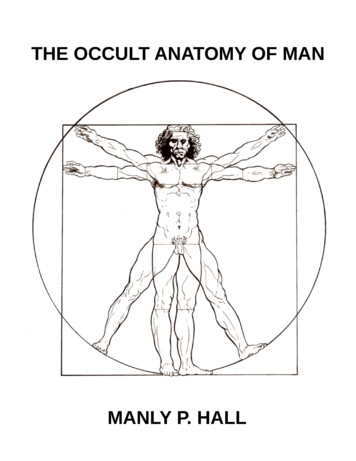
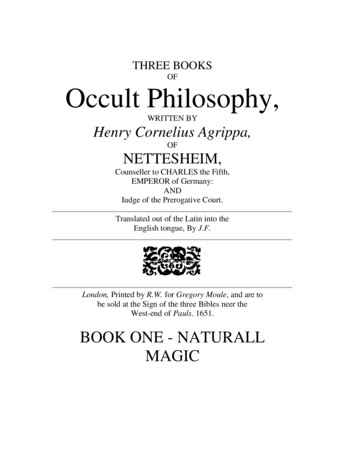
![Books/Pathfinder[Multi]/1st Edition/Campaign/Occult Realms](/img/6/occult-20realms.jpg)
